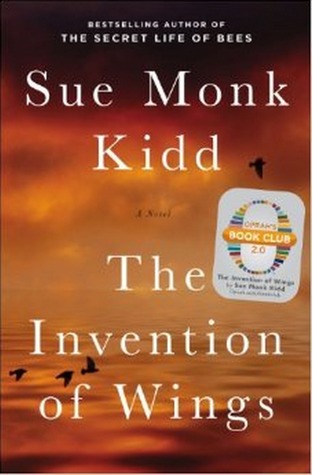The Invention of Wings
by Sue Monk Kidd
Genre: Historical Fiction
Synopsis: Hetty "Handful" Grimké, an urban slave in early-nineteenth-century Charleston, yearns for life beyond the suffocating walls that enclose her within the wealthy Grimké household. The Grimkés' daughter Sarah, possessed of a ravenous intellect and mutinous ideas, has known from an early age she is meant to do something large in the world, but she is hemmed in by the limits imposed on women.
Sue Monk Kidd's sweeping new novel is set in motion on Sarah's eleventh birthday in 1803, when she is given ownership of ten-year-old Handful, who is to be her handmaid. The Invention of Wings follows their remarkable journeys over the next thirty-five years as both strive for lives of their own, dramatically shaping each other's destinies and forming a complex relationship marked by guilt, defiance, estrangement, and the uneasy ways of love.
As the stories build to a riveting climax, Handful will endure loss and sorrow, finding courage and a sense of self in the process. Sarah will experience crushed hopes, betrayal, unrequited love, and ostracism before leaving Charleston to find her place alongside her fearless younger sister, Angelina, as one of the early pioneers in the abolition and women's rights movements.
Inspired in part by the historic figure of Sarah Grimké, Kidd goes beyond the record to flesh out the rich interior lives of all her characters, both real and invented, including Handful's cunning mother, Charlotte, who courts danger in her search for something better, and Charlotte's lover, Denmark Versey, a charismatic free black man who is planning insurrection.
This exquisitely written novel is a triumph of storytelling that looks with unswerving eyes at one of the most devastating wounds in American history, through women whose struggles for liberation, empowerment, and expression will leave no reader unmoved.
from the book jacket
Becky's review: This was a very well written historical fiction novel that told the story of a fictional slave and the real woman's family who owned her. In the afterward, Kidd tells about what is fact and what is fiction which I appreciate. Sarah Grimké was an abolitionist and befriend her slave, Handful and taught her to read and write which was illegal at the time. I appreciated Handful's story and perspective on being a slave and the terrible things that did happen. Once the story progressed and Sarah's beliefs got stronger and she began speaking out about slavery and women's rights, I felt that the book got a little preachy. There were times I skimmed her story so that I could move onto Handful's story. I also felt like the story got a little long and was a little anticlimactic. I wish that the whole novel had had the movement that the first section had.
Becky's rating: 4 stars
Marcie's review: I wish I had known that the character of Sarah Grimké was actually a real person, I think that would have helped explain some of the awkwardness around Sarah's character. While Handful was a fascinating character right from the beginning, Sarah seemed to be a wishy-washy background character until she was in middle age, at which point she dramatically shifted her views, turned Quaker, wanted to become a minister, and then became a famous spokesperson for the feminists and abolitionists. This all makes sense when you realize that Kidd had access to information about Sarah as an adult, including her journal entries, articles, and interviews, but was likely unwilling to make too much up about her childhood, since she was a real person. But I thought the story suffered for it. However, this was an extremely well-written, enjoyable to read, fascinating historical account of the life of two very different women in the time before the Civil War.
I was also annoyed that Sarah didn't keep ownership of Handful so that Sarah could free her herself when she came of age. But I suppose that didn't actually happen, and wouldn't have made for quite as interesting of a story anyway.
I was also annoyed that Sarah didn't keep ownership of Handful so that Sarah could free her herself when she came of age. But I suppose that didn't actually happen, and wouldn't have made for quite as interesting of a story anyway.
Marcie's rating: 4 stars

No comments:
Post a Comment